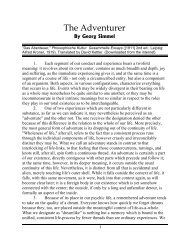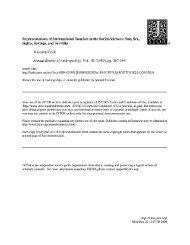The Maya Uay K'ot - OSEA-CITE
The Maya Uay K'ot - OSEA-CITE
The Maya Uay K'ot - OSEA-CITE
You also want an ePaper? Increase the reach of your titles
YUMPU automatically turns print PDFs into web optimized ePapers that Google loves.
¿Qué nos diga el General?<br />
¿Con que dinero nos paga?<br />
Si con el oro metal<br />
o con lo que el águila caga.<br />
What do you say to us General?<br />
With what money will you pay us?<br />
With gold metal<br />
or with eagle shit.<br />
<strong>Maya</strong> speakers are, apparently, no less prone to sarcasm since as Norman McQuown<br />
points out (personal communication 1994), the Yucatec <strong>Maya</strong> term for money, tak'in, is<br />
best understood as a compound noun containing the morphemes for “excrement” (ta') and<br />
“gold” (k'in). 6 In any case, if Way Kot is really a tale about commerce, it only makes<br />
sense that the protagonist doubles as money.<br />
But who, then, is way pop? Michel Boccara, who likewise notes the tendency of<br />
storytellers to use both names, suggests that the term pop – a type of reed or mat (DMC<br />
666) – designates the material from which a more technologically astute witch constructs<br />
his wings. From Bocarra's perspective the myth of Way Pop/Way Kot is undergoing a<br />
transformation parallel to the evolution of technology in Yucatán, and the term pop<br />
represents the extension of the way (witch) from a malevolent being in animal form to a<br />
malevolent technician or to technology itself. However, the only evidence provided in<br />
support of this interpretation comes from a brief description of way pop manufacturing<br />
his wings from a soft wood. No attempt is made to demonstrate that this wood is actually<br />
the reed known in Yucatec <strong>Maya</strong> as pop. Furthermore, Redfield, who also noted the<br />
tendency to substitute one name for another, claims that it was actually older people, not<br />
young ones who used the term way pop (1990 [1934]: 179).<br />
A more plausible explanation, in my view, is that the name way pop derives from<br />
an analogy between this myth and folktales about genies on flying mats that were brought<br />
to Yucatán by Lebanese immigrants in the early 1900s. <strong>Maya</strong>n myths, as Allan Burns has<br />
noted (1983: 31), have been profoundly influenced by European tales, and Domingo Dzul<br />
Poot, a well-known translator, has specifically noted the imprint of Arab tales on local<br />
forms of storytelling (personal communication, June, 1989).<br />
As both oral and written sources attest (Ramírez Carrillo 1994), Lebanese<br />
immigrants began arriving in Yucatán in the late 19 th century and got their start as<br />
itinerant merchants. Indeed, stories abound of Arab merchants traveling the back roads of<br />
Yucatán with unusual consumer goods. Although few were able to speak more than a few<br />
words of Spanish or <strong>Maya</strong>, they were persistent salesmen and would gesture or draw<br />
diagrams in the dirt in order to sell an article. In addition to developing a reputation for<br />
being stubborn (terco), they were known for their frugality. In fact, older residents still<br />
affectionately refer to Lebanese merchants by the <strong>Maya</strong>-Spanish hybrid haant cebolla<br />
(onion eater) since this was, reportedly, the only thing they needed to sustain themselves.<br />
By the mid 1920s several Lebanese families had established clothing shops<br />
(lencerias) or dry goods stores around the central plaza in Maxcanú. Judging by the<br />
number of marriages between children of wealthy Lebanese merchants and established<br />
Yucatecan families, it appears that the more prosperous families were easily assimilated<br />
into the town’s upper class; however, they were also sometimes suspected of being wayes<br />
(witches). Not only is the merchant in some versions an Arab, but when Don Román<br />
began discussing who in Maxcanú were actually wayes, one of the two names which<br />
came up was that of Don Pepe, a Lebanese merchant who owned a lucrative business in<br />
the center of town. In short, then, one might say that the name way pop (e.g., mat witch)<br />
10




